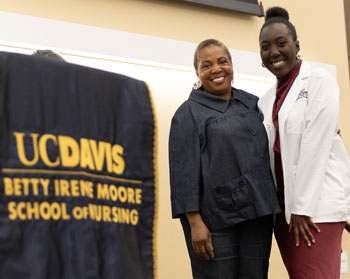Bringing passion and research to solve a problem
DNP-FNP student shares how scholarly project advances the impact she wants to have on patients and communities
Catherine Koanja, a member of the inaugural Class of 2025 in the Doctor of Nursing Practice — Family Nurse Practitioner degree program, shares her experience in the program and how her passion to help Black youth drove her scholarly project's focus.
Years before she enrolled in the Doctor of Nursing Practice — Family Nurse Practitioner (DNP-FNP) Degree Program at the Betty Irene Moore School of Nursing at UC Davis, Catherine Koanja dug into research on suicide ideation among Black youth.
Now, she’s among the first School of Nursing students to earn this degree and tackle scholarly projects that seek answers to their health care questions.
“I think that there needs to be transformation within health care. I think one of the things that would help us is to have more doctorally prepared family nurse practitioners,” Koanja said. “I didn’t really know exactly what I was getting myself into [with this DNP program], but at least I knew the topic I wanted to focus on.”
Passion and research unite

"It's more than just a box to check...it's a powerful way for nurses to make real improvements in health care." – Catherine Koanja, DNP-FNP student
During Koanja’s time as a pediatric registered nurse, she encountered young Black patients who considered suicide. Yet, research shows that health care professionals are ill equipped to handle the situation. Koanja’s scholarly project seeks to enhance awareness, cultural humility and competence among health care professionals in recognizing suicidal ideation in Black youth with the implementation of a clinical practice guideline.
A DNP-FNP scholarship project tackles real-world problems, helps make care more equitable and supports lasting changes that benefit entire communities.
“It’s more than just a box to check for graduation. It’s a powerful way for nurses to take what they've learned and use it to make real improvements in health care,” explained Program Director Charleen Singh. “These projects also help develop strong nurse leaders who are ready to shape the future of health care.”
For Koanja, she learned not only about her topic, but also about herself.
“I learned how passionate I am about this topic and how I want to make change. A lot of people were unaware that suicidal ideation was increasing amongst black youth more rapidly in comparison to other ethnic groups,” Koanja said. “By bringing the two together, me being a passionate advocate for this and then implementing it within my doctoral project, I brought awareness to this, which is the first thing we can do to bring change.”
Sharing accomplishments
Koanja will share her findings at the DNP-FNP Academic Symposium in May. She, alongside other students in this three-year program, are the first to earn the degree from the School of Nursing. That comes with an additional sense of accomplishment beyond the scholarly project.
“I am so proud, not only of myself, but my colleagues and all the students and staff. There was a lot of ups and downs and tears and happy moments, and we conquered through it all,” Koanja said. “I just can’t wait to move into that next step of actually practicing and being a provider.”





